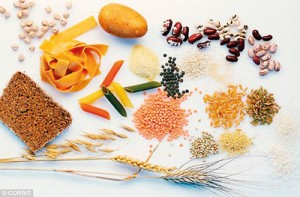Sunday Times 2
The GI diet debunked
Scientists have long warned of the dangers of eating foods high on the glycaemic index amid fears they increase a person’s risk of heart disease and diabetes.
But a new study has revealed evidence to the contrary – debunking the GI diet for those who are healthy.
The glycaemic index is a measure of how quickly foods containing carbohydrates, such as fruits, cereals and baked goods, raise glucose levels in the bloodstream.

The GI measures how quickly carbohydrates raise blood sugar levels
Those that cause a sharp spike in blood sugar levels over a two-hour period are said to have a high glycaemic index.
While those that don’t cause the big rise have a low glycaemic index.
Conventional wisdom says that high glycaemic index foods like bananas and pasta are ‘bad’ for heart health and may increase the risk of developing diabetes.
But the new study, carried out by scientists at the Johns Hopkins University of Medicine and Harvard School of Medicine in Boston, claims to have found little evidence to support these claims.
Professor of medicine at John Hopkins Medicine, Lawrence Appel, said the results ‘surprised’ the team.
‘We did not detect any clear benefits of the low glycaemic index diets on the major risk factors for heart disease, and we found no evidence of benefit for diabetes prevention,’ he said.
He added: ‘The evidence has been inconsistent that low glycaemic foods help people lose more weight or keep it off.
‘In looking at the causes of obesity and ways to control it, a narrow focus on the glycaemic index seems to be unwarranted.’
Several popular diets encourage choosing low GI carbohydrates, which has led to calls to put the glycaemic index value of foods on packaging.
But the researchers warn only laboratory tests can establish a food’s GI rating, and the results can be unexpected, for example apples score low but cantaloupe melons score high.
The scientists’ aim was to determine if foods’ glycaemic index influences a person’s heart health and risk of diabetes.
Professor Appel and study co-director Professor of medicine at Harvard, Frank Sacks, recruited 163 volunteers from Baltimore and Boston, all of whom were overweight and had above normal blood pressure.
They randomly assigned them to follow one of four diets.
Each diet contained the same number of calories, but those calories came from foods that were either high or low in carbohydrates, and high or low on the GI scale.
The volunteers ate their main meal with researchers, and took home their next two meals.
After five weeks on their assigned diets, they were switched to a different one.
‘A higher glycaemic diet would have more bananas and instant oatmeal,’ said Professor Sacks. ‘A lower glycaemic index would have more dried apricots and steel cut oats.’
The scientists tested the volunteers’ blood pressure, sensitivity to insulin, and levels of ‘good’ high density lipoprotein (HDL) cholesterol, ‘bad’ low-density lipoprotein (LDL) cholesterol and triglycerides – fat molecules in the blood stream that play a role in heart health.
The results revealed the low GI diets did not lower blood pressure or LDL cholesterol, and did not improve insulin resistance.
They showed little difference between high and low glycaemic index foods, the authors said.
Professor Sacks said it is likely people’s bodies can handle variations in food on the GI index, even if they are overweight and are already having problems with insulin resistance.
He said: ‘I guess it just works normally in most people,’ adding the glycaemic index should be studied among people with type 2 diabetes, which is also commonly known as adult-onset diabetes.
Women made up 51 per cent of the study’s volunteers, and African-Americans made up 52 per cent, so the results have broad relevance, Professor Appel said.
He advised: ‘Get back to the basics that most people already know.
‘Don’t drink sugar-sweetened drinks. Try to eat fruits, vegetables and whole grains. Try to avoid sweets, salt and foods high in saturated and trans fats.
‘People who follow these principles will reap the benefits.’
Professor Sacks said existing studies suggest there may be a benefit for people with diabetes, but there needs to be more research.
The study was published in the Journal of the American Medical Association.
© Daily Mail, London

